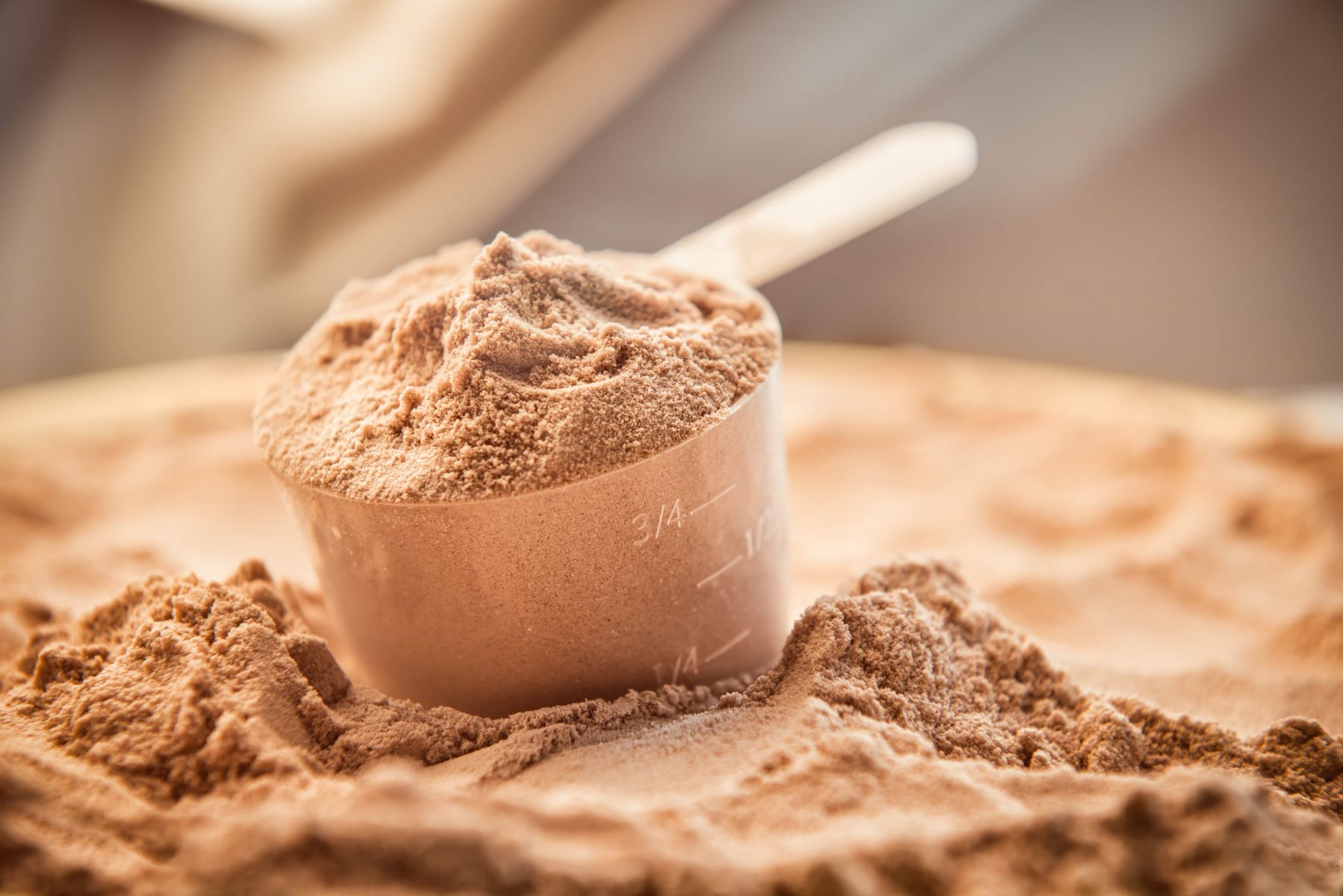Home>Misc>Featured>How Much Colostrum Should I Take For Athletic Performance


Featured
How Much Colostrum Should I Take For Athletic Performance
Modified: August 19, 2023
Discover the ideal amount of colostrum to enhance your athletic performance. Learn how featured colostrum supplementation can optimize your fitness goals.
Introduction
When it comes to athletic performance, athletes are always on the lookout for ways to give themselves an edge. From intense training regimens to specialized diets, every aspect of an athlete’s routine is carefully optimized to maximize performance. One promising supplement that has gained popularity among athletes is colostrum.
Colostrum is a substance produced by mammals, including humans, in the early stage of lactation. It is rich in essential nutrients, growth factors, and immune-boosting compounds. While colostrum has long been valued for its role in supporting infant development, recent research suggests that it may also play a significant role in enhancing athletic performance.
The benefits of colostrum for athletes are multifaceted. First and foremost, colostrum is known to enhance immune function, reducing the risk of infections and illnesses that can impede training and performance. Additionally, colostrum has been shown to improve lean muscle mass and promote muscle repair and recovery after intense workouts. It also possesses anti-inflammatory properties, which can help reduce exercise-induced muscle damage and aid in overall recovery.
Furthermore, colostrum contains a high concentration of growth factors, such as insulin-like growth factor-1 (IGF-1), which have been linked to increased strength, endurance, and athletic performance. These growth factors stimulate protein synthesis, enhance nutrient uptake, and assist in the repair and regeneration of muscle tissue, resulting in improved muscle function and performance.
While the benefits of colostrum for athletic performance are compelling, the question remains – how much colostrum should athletes take to optimize their performance? Determining the ideal dosage of colostrum is crucial to ensure athletes are reaping the maximum benefits without experiencing any adverse effects. In the next section, we will delve into the factors that should be considered when determining the appropriate dosage of colostrum for athletic performance.
Benefits of Colostrum for Athletic Performance
Colostrum offers a wide range of benefits for athletes looking to enhance their performance. Let’s take a closer look at some of the key advantages:
- Immune System Support: One of the primary benefits of colostrum is its ability to strengthen the immune system. Intense exercise can temporarily suppress the immune system, making athletes more susceptible to infections and illnesses. Colostrum contains antibodies and immune factors that help bolster the body’s natural defense mechanisms, reducing the risk of illness and allowing athletes to train consistently.
- Muscle Growth and Repair: Colostrum is rich in growth factors such as IGF-1 and transforming growth factor beta (TGF-β), which promote muscle growth and repair. These growth factors stimulate the synthesis of proteins, leading to increased muscle mass and strength. Regular colostrum supplementation can aid athletes in achieving their desired muscle development goals while supporting muscle recovery after intense training sessions.
- Enhanced Performance and Endurance: Research suggests that colostrum can improve athletic performance and endurance. The growth factors in colostrum help enhance cardiovascular function, increase oxygen delivery to muscles, and improve nutrient uptake, resulting in improved stamina and overall performance. Athletes may experience increased energy levels and reduced fatigue, allowing them to train harder and perform at a higher level for longer durations.
- Injury Prevention and Recovery: The anti-inflammatory properties of colostrum can play a significant role in injury prevention and recovery. Intense physical activity can lead to muscle inflammation and damage. Colostrum’s anti-inflammatory components help reduce inflammation, speed up healing processes, and minimize muscle soreness, enabling athletes to recover faster and get back to training more quickly.
- Overall Health and Well-being: Colostrum is not just beneficial for athletic performance but also for overall health and well-being. The nutrients and bioactive compounds in colostrum contribute to improved digestive health, better nutrient absorption, and a stronger immune system. This can lead to better general health, increased vitality, and improved overall quality of life.
These are just some of the many benefits that colostrum can offer to athletes seeking to optimize their performance. However, it is essential to determine the appropriate dosage of colostrum to ensure maximum benefits without any adverse effects. In the next section, we will explore the factors that need to be considered when determining the ideal dosage of colostrum for athletic performance.
Factors to Consider for Colostrum Dosage
When determining the appropriate dosage of colostrum for athletic performance, several factors need to be taken into consideration. These factors can help athletes personalize their colostrum dosage to suit their specific needs. Here are some key factors to consider:
- Body Weight: Body weight plays a significant role in determining the appropriate colostrum dosage. Generally, experts recommend consuming 20-40 milligrams of colostrum per kilogram of body weight per day. Athletes with higher body weights may require a higher dosage to ensure they are receiving an effective amount of the beneficial components in colostrum.
- Intensity and Duration of Training: The intensity and duration of an athlete’s training regimen can impact colostrum dosage. Athletes engaged in high-intensity or prolonged exercise may consider increasing their colostrum intake to support optimal muscle growth, recovery, and immune function.
- Goals and Performance Level: Athletes with specific performance goals, such as increasing muscle mass or improving endurance, may adjust their colostrum dosage accordingly. Consulting with a sports nutritionist or healthcare professional can provide valuable guidance on tailoring the colostrum dosage to meet specific performance goals.
- Quality and Concentration of Colostrum Supplement: The quality and concentration of colostrum supplements can vary. It is crucial to choose a reputable brand that provides high-quality colostrum with a guaranteed concentration of bioactive components. This ensures that athletes are getting the intended benefits and can impact the recommended dosage.
- Other Dietary Factors: Consideration should be given to other dietary factors, such as macronutrient intake and other supplements being consumed. Colostrum should be integrated into an overall well-balanced diet that meets an athlete’s nutritional needs.
It is important to note that every individual is unique, and what works for one athlete may not work for another. Athletes are encouraged to consult with healthcare professionals, such as registered dietitians or sports nutritionists, who can provide personalized guidance based on individual needs, goals, and health considerations.
By taking these factors into account, athletes can determine the most appropriate colostrum dosage that aligns with their specific requirements and optimize their athletic performance.
Recommended Colostrum Dosage for Athletic Performance
While there is no one-size-fits-all approach to colostrum dosage for athletic performance, a general guideline can help athletes determine a suitable starting point. It is important to note that individual needs may vary, and consulting with a healthcare professional is recommended for personalized dosage recommendations. Here are some recommended dosage guidelines:
- Begin with a lower dosage: Start with a lower dosage, typically around 20-30 milligrams of colostrum per kilogram of body weight per day. This dosage can be gradually increased over time based on individual tolerance and response to colostrum supplementation.
- Divide the dosage: Divide the total daily dosage into multiple servings throughout the day. This approach helps maintain a steady supply of colostrum bioactives in the body, optimizing its effects on immune function, muscle growth, and recovery.
- Consider the colostrum concentration: The concentration of colostrum in the supplement being used will influence the dosage. Higher-concentration colostrum supplements may require a smaller dosage compared to lower-concentration ones to achieve the desired benefits.
- Adjust based on goals and response: Regular monitoring of performance and overall well-being is crucial. Athletes should assess their response to colostrum supplementation and adjust the dosage accordingly. If improvements in performance, recovery, or immune function are not observed, a higher dosage may be considered. Conversely, if any adverse effects occur, it may be necessary to decrease the dosage.
- Consult with healthcare professionals: Athletes are encouraged to seek guidance from registered dietitians, sports nutritionists, or knowledgeable healthcare professionals for personalized dosage recommendations based on their specific needs, goals, and health considerations.
It is important to remember that colostrum supplementation is just one aspect of an athlete’s overall nutrition and training regimen. A balanced diet, proper hydration, restful sleep, and tailored training programs are equally important for optimal athletic performance.
By following these dosage guidelines and considering individual factors, athletes can harness the potential benefits of colostrum supplementation to support their athletic endeavors and enhance their performance. As always, it is essential to prioritize safety and consult with a healthcare professional before making any significant changes to one’s supplementation routine.
Timing of Colostrum Consumption for Athletic Performance
The timing of colostrum consumption is an essential factor to consider for maximizing its benefits on athletic performance. While there is no definitive consensus, here are some considerations for the optimal timing of colostrum consumption:
- Pre-Workout: Consuming colostrum before a workout can provide the body with a readily available supply of nutrients and bioactives. This can help optimize energy levels, enhance muscle strength, and improve exercise performance. Taking colostrum 30-60 minutes before exercise allows sufficient time for digestion and absorption.
- Post-Workout: Utilizing colostrum within the post-workout period is crucial for muscle repair and recovery. Colostrum’s growth factors and other bioactive compounds can assist in repairing exercise-induced muscle damage, reducing inflammation, and promoting faster recovery. Consuming colostrum within 30 minutes to 1 hour after a workout can support optimal muscle recovery and aid in replenishing nutrient stores.
- Before Bedtime: Taking colostrum before bedtime can be beneficial as it allows the nutrients and bioactive compounds to work during the body’s overnight recovery and regeneration phase. Colostrum may help optimize muscle repair, growth, and immune function during sleep, leading to better overall recovery and performance.
- Consistent Daily Use: Incorporating colostrum into a daily routine is important to maintain a steady supply of beneficial compounds in the body. Consistency is key for long-term benefits on immune function, muscle growth, and overall performance. Whether taken in the morning, afternoon, evening, or a combination of timings, it is crucial to establish a routine that works best for an individual’s schedule and adherence.
It is worth noting that individual preferences and goals may influence timing choices. Some athletes may find that they benefit from consuming colostrum both before and after workouts, while others may prefer focusing on a specific time window that aligns with their training schedule.
Remember to consider potential interactions with other supplements or foods when determining the timing of colostrum consumption. A healthcare professional or sports nutritionist can provide personalized advice based on individual needs and goals, taking into account specific training and competition schedules.
By strategizing the timing of colostrum consumption in conjunction with an overall well-balanced diet and training routine, athletes can optimize the benefits of colostrum supplementation and support their athletic performance effectively.
Potential Side Effects of Excessive Colostrum Consumption
While colostrum is generally considered safe for most individuals, excessive consumption can potentially lead to certain side effects. It is important to be aware of these potential side effects to ensure responsible usage of colostrum supplements. Here are some possible side effects of excessive colostrum consumption:
- Gastrointestinal Distress: Consuming large amounts of colostrum can sometimes cause gastrointestinal discomfort such as bloating, gas, or diarrhea. This can occur due to the high protein content of colostrum or the lactose it contains. Gradually introducing colostrum into the diet and starting with a lower dosage can help minimize these gastrointestinal side effects.
- Allergic Reactions: Although rare, some individuals may have an allergic reaction to colostrum. Symptoms of an allergic reaction can include itching, hives, swelling, or difficulty breathing. If any signs of an allergic reaction occur, it is important to discontinue colostrum supplementation and seek medical attention.
- Hormonal Imbalance: Colostrum contains various growth factors and hormones that can potentially influence the body’s natural hormone balance. Excessive consumption of colostrum, particularly with high levels of growth factors like IGF-1, may disrupt the delicate hormone balance and lead to adverse effects. Athletes should be cautious and follow recommended dosages to minimize the risk of hormonal imbalances.
- Risk of Contaminants: Like any dietary supplement, the quality and purity of colostrum products can vary. It is important to choose reputable brands that follow strict manufacturing practices to minimize the risk of contaminants. Contaminated colostrum products may pose health risks and should be avoided.
- Interactions with Medications: Some components of colostrum, such as antibodies, may interact with certain medications. Individuals taking medications should consult with their healthcare provider before starting colostrum supplementation to ensure there are no potential interactions that could interfere with the effectiveness of their medications.
It is crucial to note that the majority of individuals who take colostrum within recommended dosages do not experience any significant side effects. However, it is always important to err on the side of caution and follow recommended guidelines. If any concerns or adverse effects arise, it is advisable to seek guidance from a healthcare professional.
By being aware of the potential side effects and practicing responsible usage, athletes can safely incorporate colostrum into their supplementation routine for enhanced athletic performance and overall well-being.
Conclusion
Colostrum offers numerous benefits for athletes looking to enhance their performance. From immune system support to muscle growth and repair, colostrum’s rich array of nutrients and bioactive compounds can play a significant role in optimizing athletic performance. However, determining the appropriate colostrum dosage and timing is crucial for maximizing its benefits while minimizing potential side effects.
Considering factors such as body weight, training intensity, goals, and the quality of colostrum supplements helps athletes personalize their dosage. It is recommended to start with a lower dosage, gradually increase if needed, and divide intake throughout the day to maintain a steady supply of bioactives. Consulting with healthcare professionals, such as registered dietitians or sports nutritionists, can provide invaluable guidance in tailoring colostrum dosage based on individual needs.
The timing of colostrum consumption is also an important consideration. Consuming colostrum pre-workout, post-workout, or before bedtime can provide specific benefits such as energy enhancement, muscle repair, and overnight recovery support. Consistency and incorporating colostrum into a well-balanced diet and training routine are key to achieving long-term benefits.
While colostrum is generally safe, excessive consumption may lead to gastrointestinal distress, allergic reactions, hormonal imbalances, or interactions with medications. It is vital to follow recommended dosages, choose reputable colostrum products, and be aware of potential side effects. Any concerns or adverse effects should be addressed with a healthcare professional.
Incorporating colostrum into an athlete’s regimen can be a valuable tool for optimizing athletic performance, promoting muscle growth, supporting recovery, and enhancing overall well-being. By understanding the benefits, considering dosage guidelines, and practicing responsible usage, athletes can harness the potential of colostrum to take their performance to the next level.







